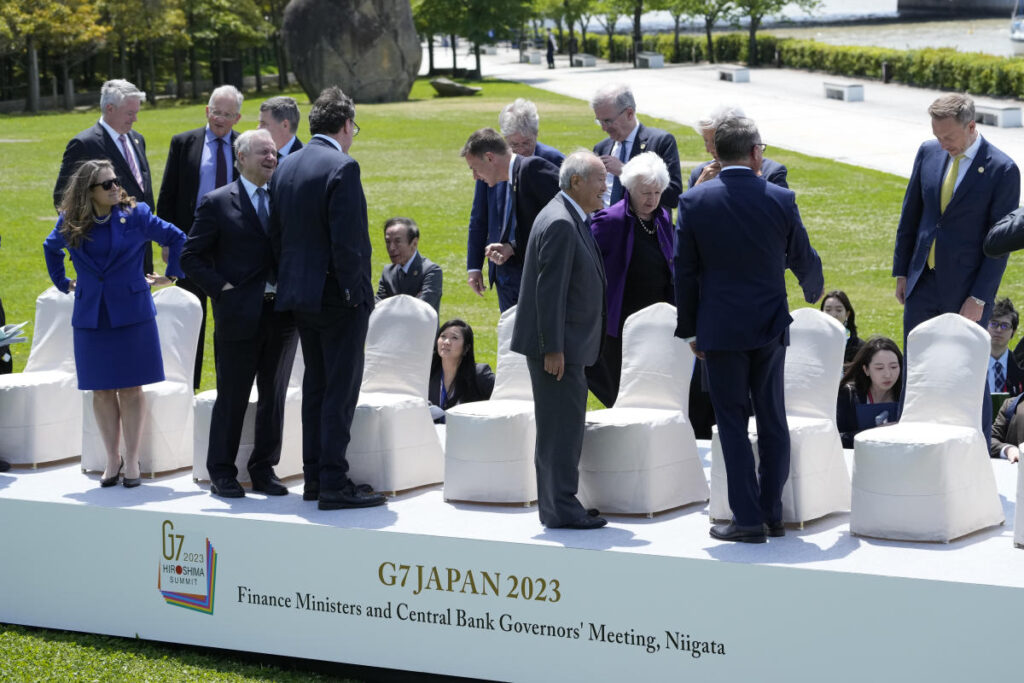FRANKFURT, Germany (AP) — Ukraine's allies are exploring ways to squeeze money from frozen Russian assets to support Kiev's war effort, a debate that has become more urgent than ever as Russia expands its territory on the battlefield and the outlook for Ukraine's state finances becomes precarious.
As finance officials from wealthy democracies gather on the shores of Italy's picturesque Lake Maggiore in Stresa from Thursday to Saturday, the top issue on their agenda is what to do about Russian central bank reserves frozen in response to the country's invasion of Ukraine.
What's at stake: Ukraine and many of its supporters seek the confiscation of $260 billion in Russian assets frozen abroad after the Feb. 24, 2022 invasion, but European officials say they are seeking legal and financial stability. They are resisting because of concerns. Most of the frozen assets are in Europe.
But European plans to simply capitalize on the interest on Russian funds provide only a small amount of funding each year. That's about $2.5 billion to $3 billion at current interest rates. This is barely enough to cover the Ukrainian government's financial needs for one month.
U.S. Treasury officials and outside economists have proposed turning the money, which trickles out each year, into a much larger upfront payment, which could be through bonds repaid with future interest income, giving Ukraine the money immediately. Ministers are due to meet on Saturday with Ukrainian Finance Minister Sergiy Marchenko.
In a speech Monday in Frankfurt, Germany, U.S. Treasury Secretary Janet Yellen said: “We are committed to collaborating on a way forward to unlock the value of Russian sovereign assets within our jurisdiction for the benefit of Ukraine. “It is extremely important and urgent that we find out.”
The debate has been reignited after President Joe Biden signed the Rebuilding Economic Prosperity and Opportunities for Ukrainians Act in April, which allows the administration to seize about $5 billion in Russian state assets in the U.S. that were included in U.S. aid. The comprehensive policy for Ukraine and other countries includes about $61 billion for the defense of Ukraine.
Ukraine spends almost all of its tax revenue on military spending and requires an additional $40 billion a year. This is to continue paying old age pensions and salaries of doctors, nurses, and teachers. These are the glue that holds society together under the harsh conditions of wartime. It was initially thought that support from allied nations and a $15.4 billion loan from the International Monetary Fund would cover four years of funding, but the prospect of a prolonged conflict clouded the outlook.
Ukraine is reliant on its allies for funding because the war means it can't borrow from international bond markets. The alternative is for its central bank to print money, which risks triggering hyperinflation.
Benjamin Hilgenstock, a senior economist at the Kyiv University of Economics Institute, said this year's budget “looks decent in terms of budget financing” thanks to EU support and a U.S. bailout package passed after months of delay, but “next year will be much tougher.”
The ministers will aim to reach an agreement ahead of the G7 summit in Italy on June 13.
Yellen will also speak at the three-day meeting about China's massive production of state-backed green energy technology, which the United States views as a threat to the global economy. It's been just over a month since she traveled to China to speak with officials in Guangzhou and Beijing about the country's massive subsidies for electric cars, batteries, solar energy equipment and other products.
Since then, the US has imposed massive new tariffs on electric vehicles, semiconductors, solar equipment and medical supplies from China, including a 100% tariff on Chinese-made EVs aimed at protecting the US economy from cheap Chinese imports.
A Treasury Department spokesman, speaking on condition of anonymity to provide advance information about the meeting, said the ministers will also discuss humanitarian assistance to the Gaza Strip and that the bilateral talks are also expected to discuss Iran's destabilizing activities in the Middle East through its proxies.
The G7 are Canada, France, Germany, Italy, Japan, the United Kingdom, and the United States. Representatives from the European Union will also participate, but the EU does not take turns chairing it every year.
___
Follow AP coverage at https://apnews.com/hub/russia-ukraine


